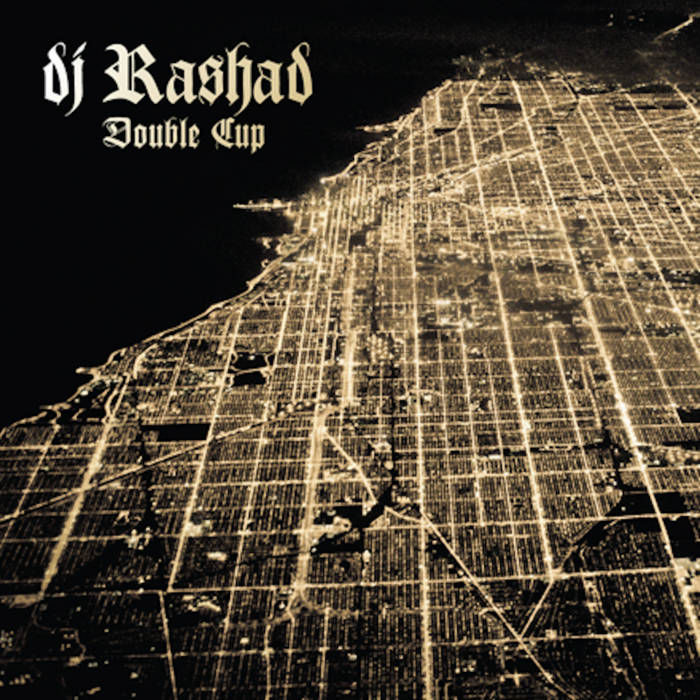REVIEW: DJ RASHAD - DOUBLE CUP
25 NOVEMBER 2013
REVIEW: DJ RASHAD - DOUBLE CUP
25 NOVEMBER 2013
REVIEW: DJ RASHAD - DOUBLE CUP
25 NOVEMBER 2013

DJ Rashad would like you to know that he doesn't give a fuck. In fact, he seems to care a whole lot about not caring—and rarely has not caring sounded like so much work. His new project, 'Double Cup', seems to be all about this contradiction. Like much of his work in the micro-genres of juke and footwork, 'Double Cup' is all about being committed. It's an extreme approach to a rather directionless musical moment, where most sophistication is invested in looking, lovingly, backwards. And for this reason, Rashad's aggressive solution will likely continue to polarize listeners.
'Double Cup' extends a lot of the sonic elements familiar from Rashad's impressive career output. There is the obsessive and frantic deployment of cheap and nasty sounds, hooks built out of chopped and accelerated R&B vocals. You might well hear echoes of early Kanye, here. This is because Rashad and West share a common referent: the Hip House sound of Chicago. The elements of juke or footwork—and whatever the hell Double Cup is—make more sense if you remember the up-tempo house beats of that sub-genre, its party-people raps and soul samples. The most famous example is still Rob Base and DJ E-Z Rock's "It Takes Two," but it's not a true specimen (not least because it's from New York). More typical were songs by Fast Eddie, The Mixmaster, or Fax Yourself, all staples of radio stations like WKKC 89.3, where Rashad started spinning in the 90s.
The interesting question, here, is Rashad's own role in this legacy. On songs like "Through The Wire," Kanye can't help but make the beats sound luxurious and expensive. He swings the track; it's hip-hop, after all. The appeal of Rashad is his refusal to do exactly that. He never eases the intensity of his flayed-nerve beats, never allows them to relax. His intentionally cheap drum sounds convey the sense of something put together on a mid-1980s analog set-up. Like footwork rhythms, these stick to that robotic, uptight pulse that you can't quite place—as if the patterns have been quantized on a machine that didn't have the programming capacity to produce the minute syncopations that project what drummers call "feel."
Get it? Rashad wants to be absolutely sure that you do. He hammers together choppy runs of sixteenth notes against his smooth, human-voiced samples to make sure that the contrast is there. And if this wasn't enough, the songs lurch in and out of double-time, an effect that makes us even more aware of just how metronomic the whole jalopy is. He doubles it, halves it, and resections it. But like the album art, that perfectly chosen pointillist flyover of Chicago, the grid remains dominant. Rashad might erase a point, or let another bisect a silence. But he never breaks the distribution with a groove. No matter how strange the variations are, the album has a mathematical core that is inexorable. It is this, combined with an undeniable ghettoism, that gives Double Cup its toughness. The guy is committed; he means this stuff.
What is interesting about the power of the grid is how does not cramp the volume of Rashad's vision. This is the brilliance of the record, a freedom that seems to grow from using familiar fragments of hip-hop and R&B in utterly perverse and unexpected ways. We hear this, almost right away, on "Feelin." It launches the record with stuttering vibe hits, the kind on cheesy hip-hop intros that say, "introduuuuucing!" The whole thing starts to get odd, and compelling, when Rashad strings these out for a whopping four and a half minutes. It's as if the vamp has taken over the rhythm, a kind of ludicrous pompousness that can only be a laugh at the expense of a genre.
Those vibes are a pretty fair warning of what's to come. With "Pass That Shit", we get the throbbing wall of sound that is typical of footwork, which counter intuitively dissolves into three minutes of menacing calm and never explodes again. Rashad knows how the song is supposed to be structured, and, just like track 7 says, gives exactly zero fucks about delivering on it. This formula, the failure-to-launch, is one of the devices that Rashad uses repeatedly on the record, maybe most effectively on "Everyday of My Life." He has a bunch of these up his sleeve. "Pass That Shit" takes the same down-tempo beat structure, and a more or less conventional rap refrain, and puts them over a pulsating R&B ostinato that is too heavy and insistent to be comfortable. It's the moment when the weed-music starts to get a little paranoid. "Only One" takes a yearning soul vocal and likewise queers it, as if beating Burial at his own game, with the most beautiful and startling arpeggios recorded recently.
These songs don't have a subject. The subject of 'Double Cup' is the music itself. Most of the lyrics—chants and slogans, mainly—are about having plenty of dope and booze. They are boring in the precise way that much hip-hop is boring. It is better to ignore these; or rather, to understand them as intentionally generic. Like most of the album, the musical devices are rhetorical, samples that stand in lieu of content. For all of the "realness" of Rashad's project, most of his elements are distanced in order to be used in a hyper-artificial way. They are there to be screwed with and masterminded: a play of energetic glyphs and residues, on a luminous matrix that presents itself in exactly the middle of nowhere, coincident with the city itself. "Out of the farmland/ and in to the grid," as another song once put it, perfectly.
Tracklist
01. Feelin (Rashad feat Spinn & Taso)
02. Show U How (Spinn & Rashad)
03. Pass that Shit (Rashad feat Spinn & Taso)
04. She a Go (Rashad feat Spinn & Taso)
05. Only One (Rashad feat Spinn & Taso)
06. Everyday of my Life (Rashad & DJ Phil)
07. I Don’t Give a Fuck (Rashad)
08. Double Cup (Rashad feat Spinn)
09. Drank, Kush, Barz (Rashad feat Spinn)
10. Reggie (Rashad)
11. Acid Bit (Rashad & Addison Groove)
12. Leavin (Rashad & Manny)
13. Let U No (Rashad feat Spinn)
14. I’m Too Hi (Rashad feat Earl)
Buy:
Vinyl
http://www.juno.co.uk/products/dj-rashad-double-cup/506446-01/
Digital
http://www.junodownload.com/products/dj-rashad-double-cup/2291676-02/

DJ Rashad would like you to know that he doesn't give a fuck. In fact, he seems to care a whole lot about not caring—and rarely has not caring sounded like so much work. His new project, 'Double Cup', seems to be all about this contradiction. Like much of his work in the micro-genres of juke and footwork, 'Double Cup' is all about being committed. It's an extreme approach to a rather directionless musical moment, where most sophistication is invested in looking, lovingly, backwards. And for this reason, Rashad's aggressive solution will likely continue to polarize listeners.
'Double Cup' extends a lot of the sonic elements familiar from Rashad's impressive career output. There is the obsessive and frantic deployment of cheap and nasty sounds, hooks built out of chopped and accelerated R&B vocals. You might well hear echoes of early Kanye, here. This is because Rashad and West share a common referent: the Hip House sound of Chicago. The elements of juke or footwork—and whatever the hell Double Cup is—make more sense if you remember the up-tempo house beats of that sub-genre, its party-people raps and soul samples. The most famous example is still Rob Base and DJ E-Z Rock's "It Takes Two," but it's not a true specimen (not least because it's from New York). More typical were songs by Fast Eddie, The Mixmaster, or Fax Yourself, all staples of radio stations like WKKC 89.3, where Rashad started spinning in the 90s.
The interesting question, here, is Rashad's own role in this legacy. On songs like "Through The Wire," Kanye can't help but make the beats sound luxurious and expensive. He swings the track; it's hip-hop, after all. The appeal of Rashad is his refusal to do exactly that. He never eases the intensity of his flayed-nerve beats, never allows them to relax. His intentionally cheap drum sounds convey the sense of something put together on a mid-1980s analog set-up. Like footwork rhythms, these stick to that robotic, uptight pulse that you can't quite place—as if the patterns have been quantized on a machine that didn't have the programming capacity to produce the minute syncopations that project what drummers call "feel."
Get it? Rashad wants to be absolutely sure that you do. He hammers together choppy runs of sixteenth notes against his smooth, human-voiced samples to make sure that the contrast is there. And if this wasn't enough, the songs lurch in and out of double-time, an effect that makes us even more aware of just how metronomic the whole jalopy is. He doubles it, halves it, and resections it. But like the album art, that perfectly chosen pointillist flyover of Chicago, the grid remains dominant. Rashad might erase a point, or let another bisect a silence. But he never breaks the distribution with a groove. No matter how strange the variations are, the album has a mathematical core that is inexorable. It is this, combined with an undeniable ghettoism, that gives Double Cup its toughness. The guy is committed; he means this stuff.
What is interesting about the power of the grid is how does not cramp the volume of Rashad's vision. This is the brilliance of the record, a freedom that seems to grow from using familiar fragments of hip-hop and R&B in utterly perverse and unexpected ways. We hear this, almost right away, on "Feelin." It launches the record with stuttering vibe hits, the kind on cheesy hip-hop intros that say, "introduuuuucing!" The whole thing starts to get odd, and compelling, when Rashad strings these out for a whopping four and a half minutes. It's as if the vamp has taken over the rhythm, a kind of ludicrous pompousness that can only be a laugh at the expense of a genre.
Those vibes are a pretty fair warning of what's to come. With "Pass That Shit", we get the throbbing wall of sound that is typical of footwork, which counter intuitively dissolves into three minutes of menacing calm and never explodes again. Rashad knows how the song is supposed to be structured, and, just like track 7 says, gives exactly zero fucks about delivering on it. This formula, the failure-to-launch, is one of the devices that Rashad uses repeatedly on the record, maybe most effectively on "Everyday of My Life." He has a bunch of these up his sleeve. "Pass That Shit" takes the same down-tempo beat structure, and a more or less conventional rap refrain, and puts them over a pulsating R&B ostinato that is too heavy and insistent to be comfortable. It's the moment when the weed-music starts to get a little paranoid. "Only One" takes a yearning soul vocal and likewise queers it, as if beating Burial at his own game, with the most beautiful and startling arpeggios recorded recently.
These songs don't have a subject. The subject of 'Double Cup' is the music itself. Most of the lyrics—chants and slogans, mainly—are about having plenty of dope and booze. They are boring in the precise way that much hip-hop is boring. It is better to ignore these; or rather, to understand them as intentionally generic. Like most of the album, the musical devices are rhetorical, samples that stand in lieu of content. For all of the "realness" of Rashad's project, most of his elements are distanced in order to be used in a hyper-artificial way. They are there to be screwed with and masterminded: a play of energetic glyphs and residues, on a luminous matrix that presents itself in exactly the middle of nowhere, coincident with the city itself. "Out of the farmland/ and in to the grid," as another song once put it, perfectly.
Tracklist
01. Feelin (Rashad feat Spinn & Taso)
02. Show U How (Spinn & Rashad)
03. Pass that Shit (Rashad feat Spinn & Taso)
04. She a Go (Rashad feat Spinn & Taso)
05. Only One (Rashad feat Spinn & Taso)
06. Everyday of my Life (Rashad & DJ Phil)
07. I Don’t Give a Fuck (Rashad)
08. Double Cup (Rashad feat Spinn)
09. Drank, Kush, Barz (Rashad feat Spinn)
10. Reggie (Rashad)
11. Acid Bit (Rashad & Addison Groove)
12. Leavin (Rashad & Manny)
13. Let U No (Rashad feat Spinn)
14. I’m Too Hi (Rashad feat Earl)
Buy:
Vinyl
http://www.juno.co.uk/products/dj-rashad-double-cup/506446-01/
Digital
http://www.junodownload.com/products/dj-rashad-double-cup/2291676-02/

DJ Rashad would like you to know that he doesn't give a fuck. In fact, he seems to care a whole lot about not caring—and rarely has not caring sounded like so much work. His new project, 'Double Cup', seems to be all about this contradiction. Like much of his work in the micro-genres of juke and footwork, 'Double Cup' is all about being committed. It's an extreme approach to a rather directionless musical moment, where most sophistication is invested in looking, lovingly, backwards. And for this reason, Rashad's aggressive solution will likely continue to polarize listeners.
'Double Cup' extends a lot of the sonic elements familiar from Rashad's impressive career output. There is the obsessive and frantic deployment of cheap and nasty sounds, hooks built out of chopped and accelerated R&B vocals. You might well hear echoes of early Kanye, here. This is because Rashad and West share a common referent: the Hip House sound of Chicago. The elements of juke or footwork—and whatever the hell Double Cup is—make more sense if you remember the up-tempo house beats of that sub-genre, its party-people raps and soul samples. The most famous example is still Rob Base and DJ E-Z Rock's "It Takes Two," but it's not a true specimen (not least because it's from New York). More typical were songs by Fast Eddie, The Mixmaster, or Fax Yourself, all staples of radio stations like WKKC 89.3, where Rashad started spinning in the 90s.
The interesting question, here, is Rashad's own role in this legacy. On songs like "Through The Wire," Kanye can't help but make the beats sound luxurious and expensive. He swings the track; it's hip-hop, after all. The appeal of Rashad is his refusal to do exactly that. He never eases the intensity of his flayed-nerve beats, never allows them to relax. His intentionally cheap drum sounds convey the sense of something put together on a mid-1980s analog set-up. Like footwork rhythms, these stick to that robotic, uptight pulse that you can't quite place—as if the patterns have been quantized on a machine that didn't have the programming capacity to produce the minute syncopations that project what drummers call "feel."
Get it? Rashad wants to be absolutely sure that you do. He hammers together choppy runs of sixteenth notes against his smooth, human-voiced samples to make sure that the contrast is there. And if this wasn't enough, the songs lurch in and out of double-time, an effect that makes us even more aware of just how metronomic the whole jalopy is. He doubles it, halves it, and resections it. But like the album art, that perfectly chosen pointillist flyover of Chicago, the grid remains dominant. Rashad might erase a point, or let another bisect a silence. But he never breaks the distribution with a groove. No matter how strange the variations are, the album has a mathematical core that is inexorable. It is this, combined with an undeniable ghettoism, that gives Double Cup its toughness. The guy is committed; he means this stuff.
What is interesting about the power of the grid is how does not cramp the volume of Rashad's vision. This is the brilliance of the record, a freedom that seems to grow from using familiar fragments of hip-hop and R&B in utterly perverse and unexpected ways. We hear this, almost right away, on "Feelin." It launches the record with stuttering vibe hits, the kind on cheesy hip-hop intros that say, "introduuuuucing!" The whole thing starts to get odd, and compelling, when Rashad strings these out for a whopping four and a half minutes. It's as if the vamp has taken over the rhythm, a kind of ludicrous pompousness that can only be a laugh at the expense of a genre.
Those vibes are a pretty fair warning of what's to come. With "Pass That Shit", we get the throbbing wall of sound that is typical of footwork, which counter intuitively dissolves into three minutes of menacing calm and never explodes again. Rashad knows how the song is supposed to be structured, and, just like track 7 says, gives exactly zero fucks about delivering on it. This formula, the failure-to-launch, is one of the devices that Rashad uses repeatedly on the record, maybe most effectively on "Everyday of My Life." He has a bunch of these up his sleeve. "Pass That Shit" takes the same down-tempo beat structure, and a more or less conventional rap refrain, and puts them over a pulsating R&B ostinato that is too heavy and insistent to be comfortable. It's the moment when the weed-music starts to get a little paranoid. "Only One" takes a yearning soul vocal and likewise queers it, as if beating Burial at his own game, with the most beautiful and startling arpeggios recorded recently.
These songs don't have a subject. The subject of 'Double Cup' is the music itself. Most of the lyrics—chants and slogans, mainly—are about having plenty of dope and booze. They are boring in the precise way that much hip-hop is boring. It is better to ignore these; or rather, to understand them as intentionally generic. Like most of the album, the musical devices are rhetorical, samples that stand in lieu of content. For all of the "realness" of Rashad's project, most of his elements are distanced in order to be used in a hyper-artificial way. They are there to be screwed with and masterminded: a play of energetic glyphs and residues, on a luminous matrix that presents itself in exactly the middle of nowhere, coincident with the city itself. "Out of the farmland/ and in to the grid," as another song once put it, perfectly.
Tracklist
01. Feelin (Rashad feat Spinn & Taso)
02. Show U How (Spinn & Rashad)
03. Pass that Shit (Rashad feat Spinn & Taso)
04. She a Go (Rashad feat Spinn & Taso)
05. Only One (Rashad feat Spinn & Taso)
06. Everyday of my Life (Rashad & DJ Phil)
07. I Don’t Give a Fuck (Rashad)
08. Double Cup (Rashad feat Spinn)
09. Drank, Kush, Barz (Rashad feat Spinn)
10. Reggie (Rashad)
11. Acid Bit (Rashad & Addison Groove)
12. Leavin (Rashad & Manny)
13. Let U No (Rashad feat Spinn)
14. I’m Too Hi (Rashad feat Earl)
Buy:
Vinyl
http://www.juno.co.uk/products/dj-rashad-double-cup/506446-01/
Digital
http://www.junodownload.com/products/dj-rashad-double-cup/2291676-02/



